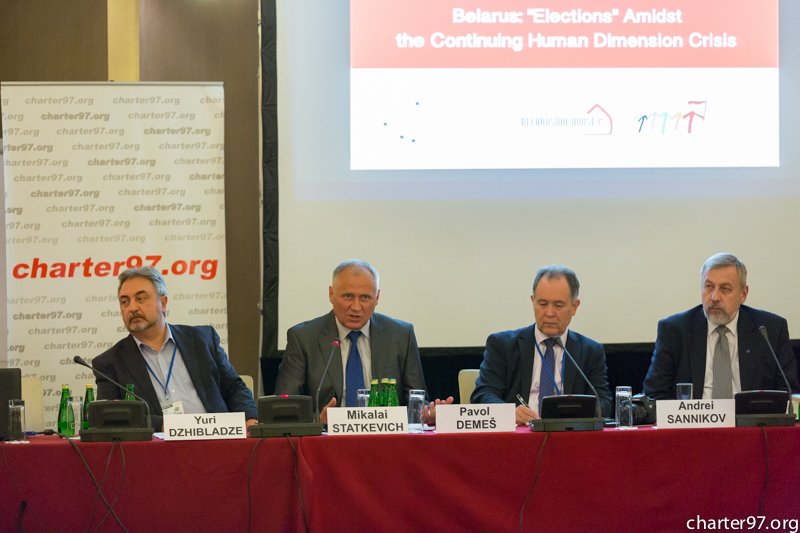Belarus has KGB operation instead of elections
- 28.09.2015, 16:41
- 4,228
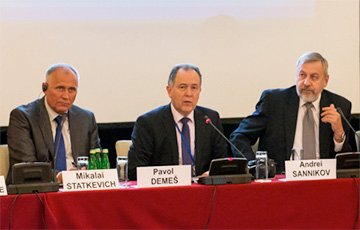
"Election" in Belarus should already be considered fraudulent.
On September 25, the OSCE Conference on the Human Dimension in Warsaw held a working session "Belarus: Elections during the Crisis of Human Rights." The discussion was organized with the support of charter97.org and the support of the Visegrad Fund and the Polish Foundation for International Solidarity.
At the meeting spoke the recently released political prisoner and presidential candidate in the 2010 elections, Mikalai Statkevich, leader of the civil campaign European Belarus, Andrei Sannikau, former Foreign Minister of Slovakia, an expert of the German Marshall Fund, Pavol Demes, president of the Polish Institute of Public Affairs, Jacek Kucharczyk, Russian human rights activist, head of the organization Freedom Files Yuri Dzhibladze, Director of the Slovak Institute of Public Policy Grigory Mesezhnikov. The working session was attended by representatives of the Ministry of Foreign Affairs of Poland, EU diplomats, including the ambassadors of the Netherlands and Switzerland, Paul Bekkers and Andrei Motyla, human rights activists and journalists.
Opening the session, Mikalai Statkevich called upon those present not to recognize the outcome of the forthcoming "presidential elections" in Belarus:
"There is a campaign in Belarus, which for some reason is called "elections". It is unique, even for such a unique country as Belarus. Everyone already knows that we do not count the votes, but now the authorities have surpassed themselves - they falsified the candidates' votes. These elections should already be considered fraudulent - a very sophisticated operation has been held, even for Lukashenka, when the intelligence agencies nominated their candidates for the masses.
The Belarusian people do not believe in any "election". And I find strange the desire of the European officials to acknowledge some progress in Belarus and to play games with Lukashenka. Firstly, it is stupid, because turning Lukashenka away from Russia is unthinkable. His regime is a puppet theater, the Belarusian economy as such is an unprofitable branch of the Russian economy. Russia could get any concessions from Lukashenka, raising the price of oil and gas to the market level. And I was released from prison only because there is not enough Russian money - the dictator is trying to get loans from the West and at the same time intimidate Putin and obtain additional funds from him. But Lukashenka needs this money only to avoid reforms. This person believes that he must control everything - losing the control over the economy, he will lose power.
The position of the democratic forces of Belarus is unequivocal and unified - we do not consider this an election. This is a farce. I consider myself a worthy candidate for the presidency of the Republic of Belarus. My rights were violated, I spent five years in prison under heavy pressure. I cannot recognize these elections as elections. Recognition of this campaign would be a betrayal of the Belarusian people.
For five years I have been trying to show the frightened Belarusian society - there are ideals worth making sacrifices! But now European politicians are somehow trying to prove to Belarusians that Lukashenka is right and Statkevich is not. But we will fight for our country, we understand that only we can make it free and independent, but, please, do not get in our way!"
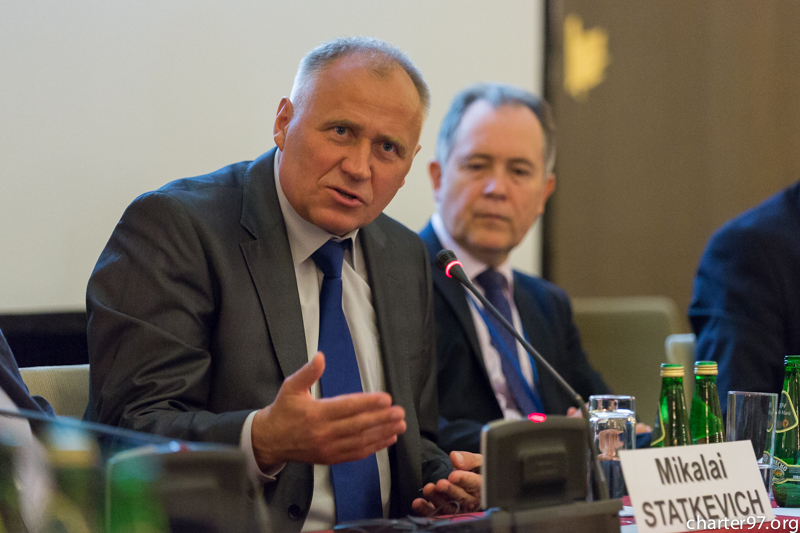
Andrei Sannikau urged everyone to support the Belarusians' desire for freedom and independence, saying that the authorities in the country today are serious criminals:
"I want to agree with Mikalai Statkevich about the true reasons for his release. Propaganda claims that the release of political prisoners is a "humanistic" gesture of the dictator. But the real reason was the lack of money. Just because of that political prisoners were released. But there is a danger. Now we hear that Lukashenka needs to be "rewarded" for the release of political prisoners. However, after he gets what he wants, he will again put into prison political prisoners and will again start trading.
In Belarus there are neither "elections" nor "candidates". The "candidates" who participate in them are a part of the same scenario, the same group, which is called the intelligence services or the KGB. And there is no reason to take at face value what is happening in Belarus - neither before the election day nor after it.
The important thing is that today's situation in Belarus cannot be considered separately. Throughout the region there are dynamic changes caused by Ukraine. What Ukrainians did was take up what the Belarusians had left off on December 19, 2010, when they came out to protest against the dictator for freedom. Today, Ukraine is carrying the torch of the struggle for our freedom.
Without proper attitude to Belarus it is impossible to support Ukraine's aspirations for independence and territorial integrity. The whole region is on the move, because it wants to be free. And Belarusians do not differ from other Eastern European nations in this. We also want to be free and live in a democracy. It is just necessary to help us achieve this.
We are often accused of the opposition being fragmented, of it being unable to get together, but today we are united. All democrats are boycotting the "election". And this criterion should be the basis for the international community's attitude to Belarus.
We expect that the EU will stick to its values, and the relationship with the dictator will be built on the principles and not on the fact that Belarus is helping to export papaya and kiwi to Russia.
Lukashenka has been in power for 21 years. During this time he and his regime heve committed terrible crimes. Yesterday we already discussed: the kidnapping of politicians, murders of journalists.
The authorities in Belarus are serious criminals, who began their crimes in 1995, shooting down two American balloonists and later destroying the Constitution of the Republic of Belarus, and so on.
Any recognition of this regime, any attempt to consider events in Belarus acceptable for the European Union, means the recognition of the Russian military presence in the country. And this is a problem of international security."
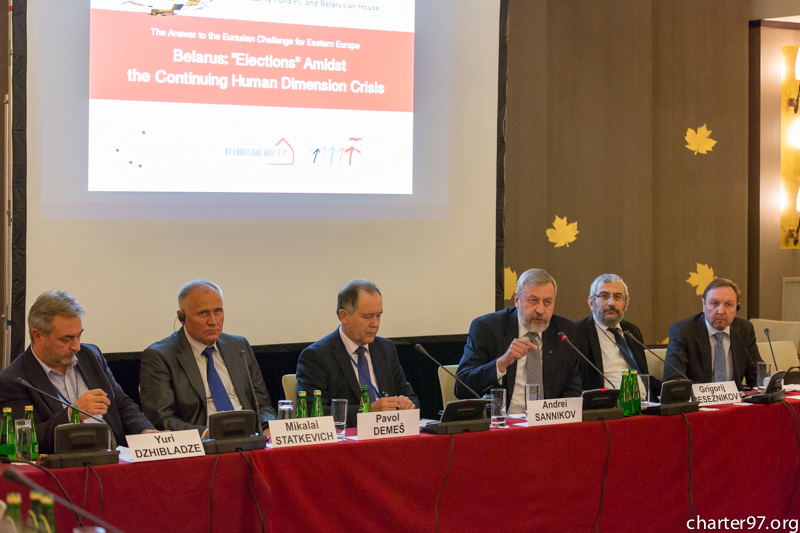
Russian human rights activist Yury Dzhibladze said that lifting today the EU sanctions from the regime of Lukashenka is out of the question -- on the contrary, the sanctions against the dictatorship should only be strengthened.
"Just three days ago here in Warsaw, I met with the senior EU official in Brussels. He plays a significant role in shaping European policy towards Belarus and conducts a dialogue with the Belarusian authorities on behalf of the European Union.
I asked him: "Is it true that the EU, as everyone says, could lift economic sanctions against Belarus after the release of all political prisoners?" The diplomat replied: "Yes, we must complete our part. Lukashenka fulfilled his part, he released political prisoners -- now is our move, we now have to do our thing. "That is, some symbolic sanctions will remain, but the main ones, economic sanctions, will be removed. Of course, provided that "elections will be held normally."
This position shows rather large self-deception in the work of the EU institutions. They imply that if "the elections are fine" - then it will be "real elections". But my colleagues have already said, there will be no elections, which could be considered fair and open.
The situation in Belarus has turned in a very deep, systemic crisis of human rights. And even the full rehabilitation of all political prisoners can only be a starting point. But there is also a number of very precise conditions on human rights, which should be the basis for the development of any political and economic relations with Belarus.
Analysis of the recommendations, which were presented by the OSCE, beginning with the Moscow Mechanism (report of 2011), as well as other annual reports, including the United Nations, shows that none of these recommendations has been fulfilled by the Belarusian authorities. Except for the release of political prisoners, which is, in the words of Mikalai Statkevich, a classic game of hostage exchange.
As soon as Lukashenka gets the economic sanctions lifted, as soon as private investments start coming -- and it is possible to conclude that the EU is preparing the ground for private investments -- he will quietly arrest another group of political prisoners and will again hold hostages to play the game, to get further concessions.
These people did not commit any crimes on December 19, 2010 or in the following months, but all of these political prisoners are under the supervision of law enforcement, their civil and political rights are limited, they cannot participate in the "elections", their rehabilitation has failed.
Attention should also be paid to the unfair trials, torture, police ill-treatment -- nothing has changed. Rather tough laws that restrict the right to freedom of expression have been adopted, new laws on blocking of websites, the inadmissibility of the assembly - the repressive apparatus received even more powers.
That is, the situation changed from bad to worse. As the UN Special Rapporteur on Belarus said: violations are systemic and systematic.
Russia's aggression in eastern Ukraine, as well as the annexation of Crimea allowed Lukashenka to take a position of "peacemaker" in the eyes of the West. As a result, the European Union or individual politicians in the EU have fallen into this trap, this self-deception. They think that Lukashenka is a "guarantor" of the independence of Belarus and Ukraine in the event of further Russian aggression in the region. We have every reason to believe that everything is just the opposite: Lukashenka in general cannot be the guarantor of the sovereignty and independence."
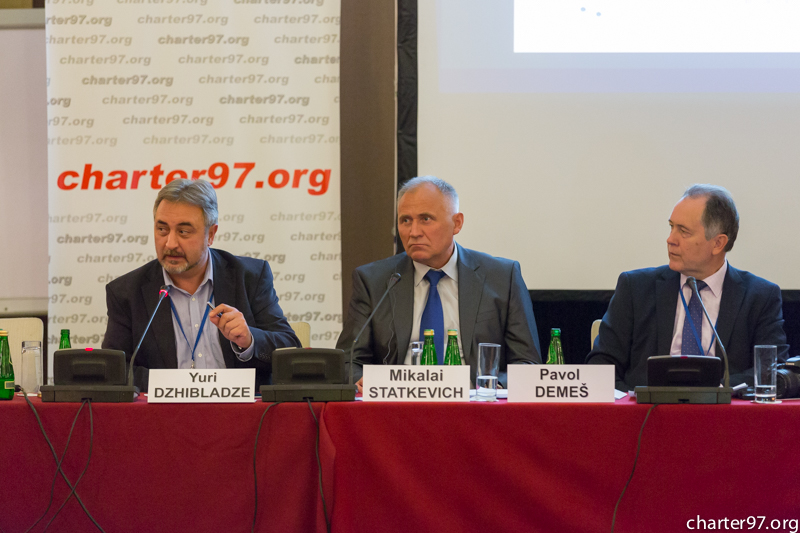
Director of the Slovak Institute of Public Policy, Gregory Mesezhnikov, warned against the possibility of "hybridization" of the European policy, which should be understood as the retreat from democratic priorities in cooperation with authoritarian regimes:
"Stories of Mikalai Statkevich and many people in the room confirm that everything happening in Belarus does not meet international standards. I am here to represent civil society of Slovakia - people who from the very beginning of democratization in Central and Eastern Europe have taken an active part in it.
In recent years we have witnessed a phenomenon of political "hybridization". We see a "hybrid war", "hybrid" policy, "hybrid" parties. Authoritarian regimes, using their ingenuity, are trying to bring these elements into their practice. I think that everything happening in recent times, including in the context of the so-called Minsk negotiations, is an attempt of the Belarusian regime to mislead the international partners.
If the EU now succumbs to the elements of "hybridity" - this will be not just a retreat from those values on which it is built. It will be a step backwards in relation to citizens of the countries which have hopes for the European way - including Belarus. The EU currently has no right to step back from the values it has applied in the last 20-25 years to countries that intend to join the EU.
Slovakia is precisely the example where the EU did not give in to the temptation to "hybridization". I mean a situation where the Prime Minister Vladimir Meciar was trying to carry on integration negotiations with the EU, pursuing a policy that did not correspond to the democratic principles. The European Union did not let Meciar play it, and after the people in Slovakia understood that the EU was not going to abandon its democratic values, democratic forces became victorious.
The values of democracy and the people in Belarus who are fighting for them deserve an appropriate stance, and if that does not happen - it will get into full contradiction with the policy of the European Union.
With regard to the Minsk talks - that is exactly the case when the Belarusian regime took advantage of the situation. But no change has taken place - it's not only a challenge to the European Union towards Belarus, but also a challenge to the European Union in relation to itself."
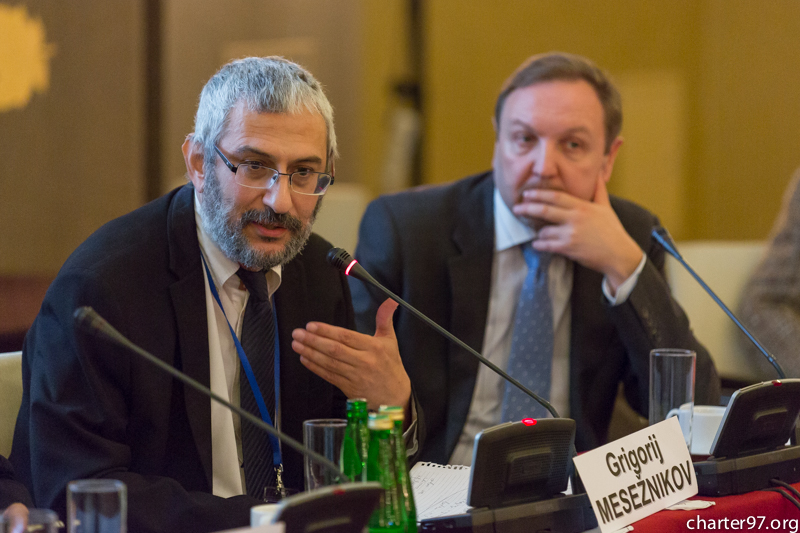
President of the Polish Institute of Public Affairs Jacek Kucharczyk recalled the determination of European politicians after the arrest of the Belarusian presidential candidates in the 2010 elections by the dictator and said that the geopolitical challenges should not affect either the rhetoric or - even more so - the principles of the European Union:
"Just the release of political prisoners should not change our attitude to the regime of Lukashenka.
I recall that once in this hotel Polish Foreign Minister Radoslaw Sikorski organized a conference - after Lukashenka's regime repressed the opposition in the 2010 elections. I remember the Minister Sikorski said then that Lukashenka must prepare the plane for the flight, because democracy is approaching Belarus.
Naturally, four years ago, there was such an atmosphere in the EU. This atmosphere was completely different from the rhetoric that we hear now. Then there were times of great hope for the democratization associated with the "Arab spring". I think that the context has changed so much that the EU policy towards Belarus became a result of this paradigm shift.
The war in Ukraine became the very factor that influenced the region the most. You can talk about shifting focus of the European policy: more attention is paid to the "hot" points and not on human rights violations in Belarus.
The war in Syria and the need to resolve related problems adds even more feeling of "fatigue" in the context of European politics -- fatigue from spreading of the European democratic values. You can talk about the appearance of the rhetoric in favor of the so-called "real politics." For example, in response to Putin's intervention in the Syrian conflict, some people said that it is necessary to cooperate with him in Syria and together fight the Islamic State.
I think that the approach to the Lukashenka's regime in Belarus is changing the same way. I want to draw your attention to a very curious and contradictory fact: the European Council on Foreign Affairs, quite a respectable organization, says that after the liberation of political prisoners, EU foreign policy must be developed so as to lift the sanctions and to start cooperation with the Belarusian regime.
This document more or less clearly states that the lifting of sanctions is necessary not because we have given a word, Lukashenka has kept his part of the promise and now it's our turn - but because by releasing political prisoners Lukashenka showed that he is trying to evade "Putin's embrace". And his completely separation from Russia is allegedly impossible due to the Western economic sanctions.
It seems to me that this argument is wrong, and it cannot be a reason to change the policy and lift the sanctions. There is a great risk that the lifting of sanctions against Lukashenka could be a rehearsal for lifting the sanctions against Russia. That is why we should resist attempts to remove the sanctions against the Belarusian regime, and the European Union must fight for its values.
If we start to play geopolitical games - we will play by the rules of Putin and not by our rules."
